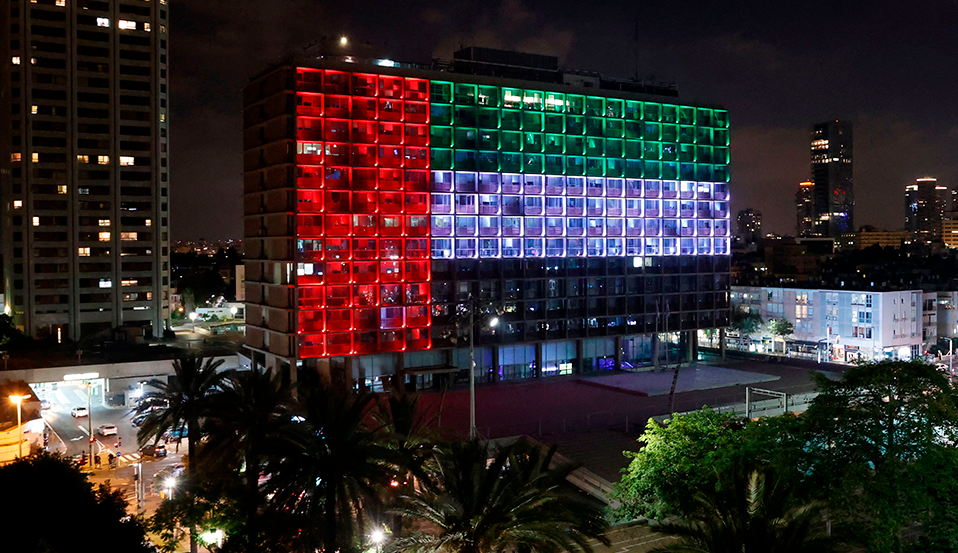

Introduction
On Aug. 13, Israel and the United Arab Emirates (UAE) reached an agreement for "full normalization of relations," ostensibly in return for an Israeli suspension of formal annexation of parts of the occupied West Bank. U.S. President Donald Trump announced the deal, which he called "a significant step towards building a more peaceful, secure, and prosperous Middle East." To better understand the agreement and how it is being perceived across the region, we asked seven MEI experts to weigh in with their thoughts.
Viewpoints
-
Paul Salem
Paul Salem

The layered consequences of the Israel-UAE normalization agreement
The agreement announced last week to normalize relations between the UAE and Israel is a watershed moment in the Middle East. It is likely to lead to other such moves, perhaps from the other members of the GCC and Morocco, and to upend regional patterns of conflict and cooperation.
At the bilateral level, this agreement brings out in the open several years of growing cooperation between the two countries. The two leaderships see eye to eye on a number of foreign policy and security concerns such as Iran, Turkey, and counterterrorism, and seek to boost cooperation on economics, investment, energy, technology, health care, as well as cybersecurity and intelligence sharing. Israeli Prime Minister Benjamin Netanyahu gets a political lifeline in the face of the prior collapse of his commitment to go ahead with West Bank annexation, a weak standing in the polls, and pending corruption allegations. For the UAE it is a calculated gamble to further boost the country’s growth and increase its influence regionally and internationally.
For the Palestinians, it was seen as another tragic betrayal by another Arab state and described as such by their leaders. It breaks ranks with the Arab League’s own 2002 peace offer, and grants Israel normalization with only a “pause” on annexation of large parts of the West Bank. The UAE insists that this “pause” is to be understood as a standing long-term part of the agreement, but Netanyahu has declared that he is still committed to annexation, only that he has suspended the timing of implementation. The Palestinians had continued to hope that normalization with states beyond Egypt and Jordan (and Turkey) could be used as leverage to get the Israeli government to suspend settlement and expropriation activities and to negotiate seriously toward a two-state solution. While the hypothesis is valid, the reality is that that policy had not created meaningful leverage over the Israelis and had led to U.S.-Israeli collusion over a two-state-ending proposed annexation of large parts of the West Bank. The UAE-Israel agreement was driven by the interests of those two states, but has upended the situation for the Palestinians. While the UAE and Israel pursue their bilateral interests, diplomatic attention both regionally and internationally should be focused on how to cement the annexation freeze and resume necessary Israeli-Palestinian talks toward a two-state solution. Perhaps with a new, more fair-minded administration in Washington in 2021, and more Arab interlocutors in the negotiations, there might be hope for some progress in a process that was declared moribund years ago. Indeed, diplomatic efforts must remain focused on bringing about the only possible lasting solution between the impossibilities of a one-state solution and the purgatory of apartheid: a two-state solution.
At the regional level, the UAE-Israel agreement — and possible other agreements to follow from the Gulf — reshuffles the strategic map. It brings out into the open what was already strong cooperation to counterbalance and push back against Iran. But for the UAE, it also consolidates partnership with a powerful player in the Red Sea and relates to the UAE’s growing economic and strategic interests in the Horn of Africa. It also strengthens the UAE’s partnership with a key player in the eastern Mediterranean, where there is an ongoing contest with Turkey in Libya as well as over the future of energy routes to Europe.
The UAE has to worry about potential regional blowback from the decision. Egyptian President Anwar Sadat’s separate peace with Israel led to isolation in the Arab world and eventually to his assassination. And there are likely heightened alerts about potential attacks in the UAE from radical extremist or terrorist groups. But the UAE’s move is likely to lead to similar moves by others, not to isolation; and the small Emirati population has a high level of trust and confidence in its leadership. The challenge for countries like Saudi Arabia will be much harder.
Iran will try to take advantage of the Emirati “separate peace,” but that is not likely to lead to any change in Iran’s influence in the region. The days when Iran could hope to have a wide appeal were lost in the carnage in Syria, but it still enjoys an arc of influence in wrecked countries, including Lebanon, Syria, Iraq, and Yemen. The act — or trend, if it widens — of normalization with Israel must be a worrying one for Iran.
Turkish President Recep Tayyip Erdogan will try to take advantage as well, mainly to rally his domestic base and to appeal to disgruntled groups around the Arab world who see this act as one of betrayal of the Palestinian and, because of Jerusalem, the Islamic cause. But Erdogan knows the importance of having leverage with the Israelis — indeed, he visited Israel in 2005, and for many years played the regional mediator with the Israelis — and must also be concerned about the impact of this new alliance on his ambitions in the Mediterranean.
Internationally, the agreement strengthens the UAE in Washington and strengthens the U.S. in the Middle East. After years of having a bumpy road in Washington, this agreement provides the UAE with long-term support from both Republicans and Democrats going forward, as well as from the influential pro-Israel lobby. It is likely to make the UAE crown prince as influential in Washington as were in different eras King Hussein of Jordan, and before him President Sadat of Egypt. For the U.S., to have key allies in Israel and the Gulf cooperating openly is certainly an influence multiplier at a time when both Russia and China are making inroads in the region.
The Israel-UAE agreement is indeed a watershed moment in the Middle East that creates both risks and opportunities. The main focus should be how to use this diplomatic breakthrough to encourage other diplomatic breakthroughs in the region, perhaps in relation to Iran and Turkey, and how to redouble efforts to revive Israeli-Palestinian negotiations toward a two-state solution, in a regional environment that now might be slightly less polarized and more engaged and supportive of a positive outcome.
-
Khaled Elgindy
Khaled Elgindy

Normalizing Israeli occupation
The recent announcement of normalization between the UAE and Israel, ostensibly in return for Prime Minister Benjamin Netanyahu’s agreeing to “suspend” his plans to annex parts of the West Bank, could very well rewrite the rules of Arab-Israeli peacemaking. Whatever benefits the new UAE-Israel deal may hold for the Emiratis, Israel, and the Trump administration, these come largely at the expense of the Palestinians — who along with the dwindling prospects of a two-state solution represent the biggest losers in this new arrangement.
The agreement was roundly, and immediately, condemned by Palestinians across the political spectrum. Palestinian President Mahmoud Abbas called it an act of “treason” and recalled his ambassador from Abu Dhabi in protest, while Hamas described it as a “stabbing in the back of our people.” For their part, the Emiratis have sought to spin the decision to normalize with Israel as a “death blow” to Israel’s planned annexation of Palestinian land, thereby rescuing the two-state solution. The reality, however, looks rather different.
For one, Netanyahu had already been forced to shelve his annexation plans in response to international outrage, and in any case is still vowing to press ahead with annexation despite the ostensible accord with the UAE. Whether or not formal annexation goes forward, de facto annexation via settlement expansion will continue unabated.
Indeed, the American-brokered declaration between the UAE and Israel is a fulfillment of the Trump administration’s so-called “outside in” approach designed to circumvent and ultimately sideline the Palestinians by leapfrogging directly to Arab/Israel normalization.
Perhaps most crucially, the UAE’s decision shatters the consensus of the Arab Peace Initiative by which Arab states had agreed to normalize relations with Israel only in return for Israel ending its occupation and allowing the establishment of a viable and genuinely independent Palestinian state.
In short, the new UAE-Israel announcement does not just normalize bilateral relations between the two countries, which have existed barely under the table for many years; for Palestinians, it also helps to normalize (if not actually reward) Israel’s occupation, including its vast settlement enterprise, which is illegal under international law, and other systematic violations of Palestinian rights.
Meanwhile, the possibility that other Gulf Arab states might follow suit, as many are now speculating, could permanently bury the Palestinian question and with it whatever slim hopes may still remain for a two-state solution.
-
Gerald M. Feierstein
Gerald M. Feierstein

UAE normalization with Israel fits long-standing Emirati foreign policy
The UAE decision to normalize its relationship with Israel, formalizing a long-standing reality of Emirati-Israeli cooperation, fits into an Emirates nationalism project that has been a principal objective of its policies, both foreign and domestic, under the leadership of Abu Dhabi Crown Prince Mohammed bin Zayed. From Libya to the Red Sea/Horn of Africa, Yemen, and now the Israeli-Palestinian conflict, the Emirates has ignored traditional pan-Arab positions and instead pursued initiatives to strengthen the UAE brand: confronting political Islam; expanding its economic reach; and establishing itself as a major player in regional defense and security affairs.
Undoubtedly, an overt relationship with Israel provides the UAE with an additional level of security guarantee against Iran, especially as the U.S. in the Trump era remains an uncertain ally. But UAE perspectives on Iran have also evolved, focusing more heavily on reducing tension for at least the last year since it advertised its decision to withdraw militarily from Yemen as a “signal” to Iran that it sought to reduce the risk of conflict. The UAE has continued its outreach to Iran since the COVID-19 outbreak, including a video conference between the two foreign ministers, Abdullah bin Zayed and Javad Zarif, earlier in August that Zarif described as “substantive, frank, and friendly.” Thus, Iran may not be a main target of the Emirates-Israeli tie-up.
Perhaps more significantly, the UAE’s diplomatic initiative opens the door to greater Israeli engagement with the anti-political Islam coalition of the UAE, Egypt, and Saudi Arabia. Israeli support could be particularly helpful as the UAE and Egypt continue to confront Turkey in the Libyan civil war — where Turkey currently holds the upper hand in support of the Tripoli government, which is perceived by Abu Dhabi as “Islamist.” The new relationship can also undercut Israel’s complicated relationship with the UAE’s regional rival, Qatar, which has long maintained its own arm’s-length relations with Israel.
While it seems unlikely that Saudi Arabia will follow suit quickly in establishing formal relations with Israel, at least as long as King Salman remains on the throne, it’s unlikely that the Emirates would have taken this step without Saudi acquiescence. The Saudis will undoubtedly watch with interest the international, especially Arab and Islamic, reactions to the move and will take that into account as they ponder their position. The UAE move also plays well for the Emirates in the U.S. domestic context. While it’s seen as a (marginal) boost to the Trump campaign, it will not complicate Emirati relations with a potential Biden administration and will help insulate the UAE from criticism on Capitol Hill.
-
Nazila Fathi
Nazila Fathi

In Tehran, angry words and threats, but also fears
Iran angrily condemned Thursday’s announcement by President Donald Trump that Israel and the UAE had agreed to normalize relations in exchange for Israel’s suspending annexation of parts of the occupied West Bank. Foreign Minister Mohammad Javad Zarif called the deal “treacherous.” Saturday’s front pages lambasted the agreement as a stab in the back. The moderate daily Etemad called it “Sheikh Zayed’s Gamble” while the hardline daily Javan ran the headline “Emirates’ Betrayal and Blunder.”
Like Turkey, Iran sees Israel as the biggest winner of the deal. But behind Tehran’s bluster remains its grave fear that two of its adversaries in the region have come together under the Trump administration to undermine its regional influence.
The deal came on the heels of the U.S. sanctions that have devastated Iran’s economy. President Hassan Rouhani accused President Trump of brokering the deal and announcing it in Washington in order to win the November elections.
“Why did it happen now?” Rouhani asked during a speech on Saturday. “If it weren’t a wrong deal, why was it announced in a third country, in America? So, a gentleman in Washington wins votes. You betray your country, your people, Muslims, and the Arab world?”
Iran’s hardline Islamic Revolutionary Guard Corps, which has trained and funded Palestinian militants for decades, warned the deal would accelerate Israel’s annihilation. Zarif called Ziad al-Nakhala, secretary-general of the Palestinian Islamic Jihad resistance movement, and assured him that the agreement will not impact the Palestinian cause.
Iran worries the deal could be a prelude for other Arab countries to forge relations with its arch-enemy and break away from the previous Arab consensus of creating a Palestinian state that Iran had rallied for. The daily Kayhan, a conservative publication whose editor is appointed by Iranian Supreme Leader Ayatollah Ali Khamenei, wrote in a front-page article that Saudi Arabia and Bahrain may soon follow the UAE’s lead. Both countries along with Oman have quietly courted Israel, but the daily refrained from naming Oman, which has close ties with Iran.
Mocking the Emirates and calling it a country younger than the trees planted on Tehran’s major Valiasr Avenue, Kayhan went on to issue a warning, too. “The UAE’s grand betrayal of the Palestinians and normalizing ties with the Zionist regime has one outcome, which is turning this tiny wealthy country in need of security into ‘an easy and legitimate target’ for the resistance,” it added, referring to militant forces opposed to Israel.
-
Birol Baskan
Birol Baskan

A strong, swift response from Turkey, driven by ideology and domestic pressure
On Aug. 13, the UAE and Israel, joined by the United States, issued a statement declaring that they agreed to a full normalization of their relations. The UAE thus became the third Arab country after Egypt (1979) and Jordan (1994) and the first Gulf Arab country to officially recognize Israel. The extent of their bilateral relations is not yet clear, but this is surely an historic step.
The Turkish reaction to the deal has been strong and swift. Ibrahim Kalin, the spokesperson for the Office of the President, described the deal as “treason to the Palestinian people,” while the communications director, Fahrettin Altun, declared the agreement “null.” More critically, of course, the Turkish president himself, Recep Tayyip Erdogan, stated that the move was against the Palestinian people and said Turkey may suspend its diplomatic relations with the UAE and close its embassy in Abu Dhabi.
Hailing from the Islamist tradition in Turkey, which has always been vocal about the plight of the Palestinians and deeply internalized the Palestinian cause, the leadership cadre of the ruling Justice and Development Party (AKP) might genuinely see the UAE’s step as miscalculated or even treacherous to a cause where all Muslims should act in unison. The fact that Turkey itself has diplomatic relations with Israel is seen as irrelevant; by the time the AKP came to power, Turkey had long established relations with Israel and the AKP would never move to end them.
In line with the Turkish Islamist tradition, the AKP leadership cadre has also been vocal about Turkey’s untapped potential to lead the Muslim world in matters concerning the whole ummah. It has worked to position the country in that role, and Turkey would have reacted in one way or another to the UAE’s step for that reason alone.
There is also domestic pressure to consider as well. Turkey’s Islamists, Erdogan’s most loyal supporters, see in him a savior of the ummah and would be deeply disappointed if he did not react to the UAE’s decision. More paradoxically, perhaps, the secular opposition in Turkey also pushes Erdogan to act in the same direction — not on the basis of the same beliefs of course, but simply to get him stuck in ideological gridlock. The secular opposition thus pursues, inadvertently and shortsightedly, what amounts to an Islamist agenda, as was also evident in the recent debate over the status of Hagia Sophia.
Fortunately for Turkey, Erdogan can also be a pragmatist and most likely he will let this storm pass, condemning the move but not going beyond rhetoric to action. Turkey-UAE diplomatic relations are already badly damaged, but they have a long way to go before a total collapse.
-
Mirette F. Mabrouk
Mirette F. Mabrouk

Official approval, but popular unease in Egypt
The announcement of the decision by the UAE to normalize relations with Israel was received in Egypt in three ways. The first and most upbeat response was reflected in the state announcements, which described the agreement as an important tool in the almost empty peace process toolbox. One of the agreement’s stated aims was to put paid to the Israeli decision to annex parts of the West Bank. President Abdel-Fattah el-Sisi’s official account tweeted that he had been following the news of the deal, described as one designed to prevent annexation and promote regional security and prosperity. There wasn’t the explosion of congratulatory op-eds that one would have expected, but those that did tout the deal took the line that the UAE stepped up to prevent a larger evil: Israeli annexation and the further sliding of the peace process down an Alice in Wonderland rabbit hole, growing deeper by the second. This wasn’t surprising in any way — after all, Egypt maintains close diplomatic, security, and economic links with the UAE and has a solid working security relationship with Israel.
The second response was very like that to the death of an elderly and unwell relative. The news had been coming a long time and, indeed, was inevitable, but caused sadness nonetheless. This reaction is perhaps the most complex of the three; after all, Egypt has had its own peace treaty with Israel for over 40 years and while it remains unpopular with most Egyptians, it is grudgingly accepted as a fact of life — necessary if unpleasant. Disapproval of another country treading the same path would seem bizarre at best, downright hypocritical at worst.
The third response resounded though op-eds and social media and it reflected anger and disappointment in varying shades. Editorials questioned why leaders often dressed up unpalatable facts or necessities as options for the good of their own countries or others. They also noted that the deal merely allowed the UAE to formalize a longstanding relationship. The claim that the deal would prevent annexation came under particular scrutiny since it had been apparent for some time that Israeli Prime Minister Benjamin Netanyahu had bitten off more electoral promise than he could chew and that annexation was both difficult and only popular with a minority of Israelis. There was also the overriding feeling of injustice. Egyptians are laboring under their own set of considerable difficulties but the Palestinian issue remains a moral and deeply visceral one to many. The feeling that Israel was going to continue to abuse the rights of Palestinians with impunity leaves a sour taste in people’s mouths.
-
Roie Yellinek
Roie Yellinek

The evolving American axis
The UAE-Israel diplomatic agreement announced on Aug. 13 drew immediate attention and reactions from many countries in the region and beyond. The deal should be seen as part of the establishment of an American axis in the Middle East. This evolving axis came about shortly after the rivalry between China and the U.S. reached a new height with the leaking of details last month about a major investment and security agreement between China and Iran, which severely undermined U.S. sanctions on Iran. It also came just four days after the visit of U.S. Health and Human Services Secretary Alex Azar to Taiwan, the highest-level visit by an American official since the break in diplomatic relations between Washington and Taipei in 1979.
The deal between the UAE and Israel, two long-standing U.S. allies, can be seen as a response to the Iran-China pact and part of the ongoing struggle between the two leading global powers for international influence. The UAE and Israel, alongside Egypt, Sudan, and Saudi Arabia — for now only in the background — are part of the U.S. sphere of influence. Iran, Iraq, Syria, and Turkey are in the Chinese sphere, while the rest of the region hasn’t decided yet or would prefer not to choose. We might see some changes in the countries aligned with the two axes, but this agreement and the China-Iran one before it have created their core and perhaps even established their local leaders. Russia, the third great power, tends to align with the Chinese bloc, but has much greater expectations and ambitions than the other countries in Beijing’s axis.
The agreement is a big deal for the UAE, Israel, and the U.S., and a blow to Iran, Turkey, and of course the Palestinian people. The American leadership, which likes to portray itself as the moral side in the great superpower struggle, must listen to the voices of the neglected and do everything it can to avoid a collision between the axes. Should that happen, the price everyone will pay will be higher and the results more painful than they were during the Cold War. The world of today is far more connected than it was then — and that applies to everything from the internet to the global economy.











